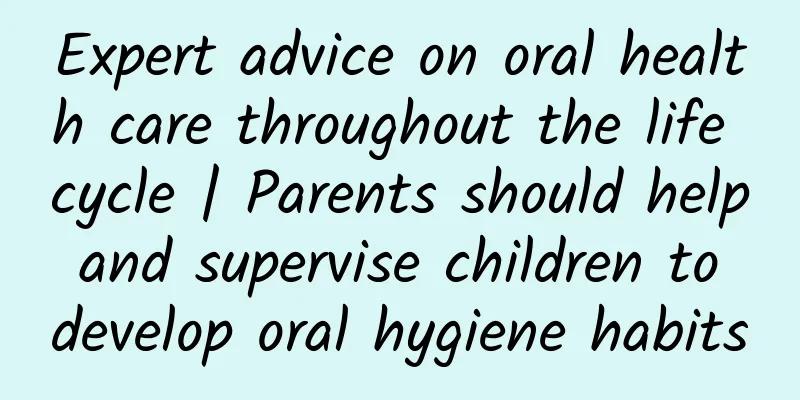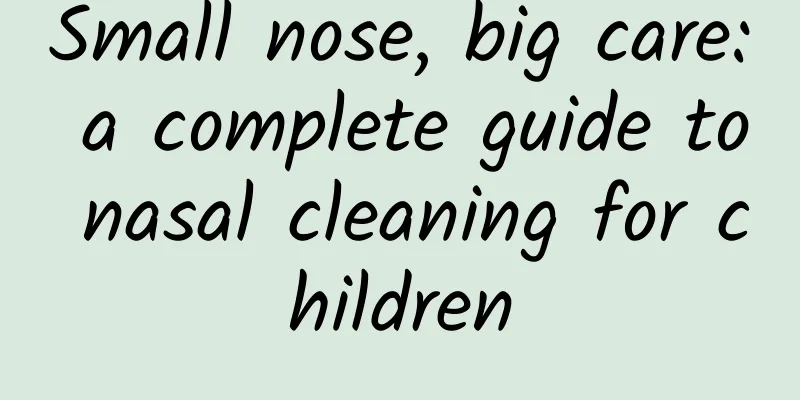Expert advice on oral health care throughout the life cycle | Parents should help and supervise children to develop oral hygiene habits

|
Author: Li Rui, Feng Xiping, Shanghai Ninth People's Hospital, School of Medicine, Shanghai Jiao Tong University Childhood is a critical period for the growth and development of children's oral and maxillofacial areas. A healthy oral cavity is the guarantee for children to have normal chewing function, accurate pronunciation, symmetrical facial features and even overall health. During this period, parents, as the first teachers on the children's growth path, play a vital role and should actively guide, help and supervise their children to develop good oral hygiene habits. 1. Cultivate children's awareness of oral hygiene Before the teeth erupt, parents should clean their children's mouths. Parents can wrap soft gauze around their fingers and gently wipe the gums and oral mucosa after feeding to remove milk stains and food residues. From the time the first deciduous tooth erupts, parents should use appropriate cleaning tools (such as gauze, latex finger cots or soft-bristled toothbrushes) to clean their children's teeth and mouths at least twice a day. Expose children to oral hygiene measures early in life, help them adapt to daily oral care, and cultivate their awareness of daily oral cleaning. 2. Cultivate children's oral hygiene habits Parents can guide, instruct, help and supervise their children's toothbrushing at different ages. For children aged 0 to 3 years old: At this stage, since children's intelligence and hands-on ability have not yet reached the level of using a toothbrush to brush their teeth, brushing their teeth is mainly done by their parents. Measures can be taken to attract children to participate. For children aged 3 to 6 years old: As the coordination ability between the brain and limbs has improved, children can learn to brush their teeth using the "arc brushing method" under the guidance of their parents, but parents still need to help their children brush their teeth at least once a day and supervise the process of their children brushing their teeth. For children over 6 years old: Parents still need to supervise and help their children brush their teeth, ensure that their children brush their teeth twice a day, use the correct brushing method each time, and have enough brushing time to ensure the quality of brushing. During the brushing process, parents can brush their teeth with their children to serve as a role model, or they can turn brushing teeth into a family parent-child activity to increase fun and improve children's enthusiasm for brushing teeth. 3. Help establish other good habits of loving teeth Good eating habits are an important part of maintaining oral health. Parents should guide their children to reduce the intake of high-sugar and acidic foods; limit the number of sweets they eat each day; require them to rinse their mouths immediately after eating sweets; and for infants and young children, avoid sleeping with a bottle in their mouths and make sure to clean their mouths before going to bed. Parents should pay close attention to various bad habits in children's lives, such as biting pencils, sticking out tongues, breathing with mouths open when sleeping, biting upper and lower lips, sucking fingers, etc. These bad oral habits often cause children's malocclusion, overbite, etc. Once parents find that their children have these habits, they should stop them in time and seek help from dentists. In addition to daily home care, parents should also take their children to the hospital for regular oral examinations. Children can see a dentist in the first year after birth and after the deciduous teeth erupt. It is recommended to have a professional oral examination every six months to achieve "early detection and early treatment" to prevent further development of the disease. 4. Parents should set an example and play a role model Parents should set an example by maintaining good oral hygiene habits. Through parent-child interaction and learning oral health knowledge together, children can develop good oral hygiene habits in a relaxed and pleasant atmosphere. In short, parents play a vital role in helping and supervising children to develop oral hygiene habits. Through scientific methods, patient guidance and continuous efforts, we can build a solid oral health defense for children, making their smiles brighter and their future better. (Contributed by the Popular Science Department of the Chinese Stomatological Association and the Oral Preventive Medicine Committee of the Chinese Stomatological Association) |
<<: Can massage help arthritis?
>>: When you need help falling asleep, does melatonin work? Are there any dangers?
Recommend
My period is almost over and my waist hurts. Why?
In our daily life, many female friends have vario...
Can I eat fish maw during menstruation?
Nowadays, many people have higher demands for qua...
How to treat vulvar itching? Drug treatment is effective
Generally speaking, if you suffer from vulvar itc...
Low-lying placenta
Low-lying placenta is a common form of abnormal p...
How to diagnose lung cancer? Doctor: There are three "magic weapons" to diagnose lung cancer
Today a colleague asked me, "Why are there s...
How many days after pregnancy can you use the early pregnancy test paper to detect
How many days of pregnancy can be detected with a...
Can I use foot patches during my period?
During menstruation, female friends must pay atte...
What causes abdominal pain and vaginal bleeding?
Nowadays, more and more women are suffering from ...
How to maintain after hysterectomy?
Every woman wants to be beautiful and healthy at ...
Is it reliable to use parasites to treat tumors?
Studies by multiple research groups have shown th...
[Not So Safe] The Dance of Alcohol and Drugs - A Dangerous Encounter
"Cephalosporin and alcohol, just go", t...
How to delay your period
Menstruation is a normal physiological phenomenon...
Can deer antlers treat milk accumulation?
Postpartum milk accumulation is common in mothers...
What's going on with goose bumps on my arms?
Women's skin health is related to their image...









